*This post contains spoilers for episode 6 of Star Trek: Discovery, as well as the Next Generation episode “Sarek”, and the Original Series episode “Journey to Babel”.
Star Trek: The Original Series – “Journey to Babel” (season 2, episode 15)
Written by D.C. Fontana; directed by Joseph Pevney; first aired in 1967
The Enterprise is headed for a diplomatic conference, carrying over a hundred representatives of different alien worlds, including the Vulcan ambassador Sarek and his human wife, Amanda … who just happen to be Spock’s parents, though you wouldn’t know it from the way Sarek greets his son. Spock and Sarek haven’t been on speaking terms since Spock turned down entrance to the Vulcan Science Academy to join Starfleet, which Sarek feels –sorry, thinks – was Spock shirking his duty. Now, Sarek is gravely ill, and needs a transfusion of Vulcan blood. But with a mysterious hostile vessel stalking the Enterprise, and Captain Kirk badly injured by an undercover assassin, Spock won’t agree to the transfusion as long as he’s required, by Starfleet regulations, to fill in for Kirk and get the Enterprise safely to the conference … meaning that his sense of duty might, ironically, cost Sarek his life.
VS.
Star Trek: The Next Generation – “Sarek” (season 3, episode 23)
Teleplay by Peter S. Beagle; story by Peter S. Beagle, from an unpublished story by Marc Cushman & Jake Jacobs; directed by Les Landau; first aired in 1990
A century after the Babel Conference, Sarek is once again travelling on a ship called Enterprise to conduct sensitive diplomatic negotiations with elusive aliens. Those negotiations might be jeopardized, though, by mysterious outbreaks of hostility among the crew … outbreaks which Picard soon comes to suspect are being caused by Sarek himself, whose loss of emotional control is telepathically effecting those around him. Confronted with the truth, Sarek refuses to postpone the negotiations, which have been a very, very long time coming. Instead, Picard accepts a mind meld with Sarek, and temporarily takes those uncontrollable emotions off his hands … getting to experience, in the process, a whole lot of emotions the ambassador has been suppressing.
VS.
Star Trek: Discovery – “Lethe” (season 1, episode 6)
Written by Joe Menosky and Ted Sullivan; directed by Douglas Aarniokoski; first aired in 2017
Years before the Babel Conference, Sarek is on his way to negotiate for peace with the Klingons, when his ship is sabotaged by an extremist sect of Vulcans who see humans as inferior. With his ship adrift in the middle of space-nowhere, an injured and delirious Sarek makes contact with his adopted human daughter, Michael Burnham, through the psychic link that they share. With the help of her new protégé, Tilly, and the new guy onboard Discovery, Tyler, Burnham tries to use that psychic link to find Sarek, so Discovery can rescue him. Inside Sarek’s confused mind, Burnham finds him fixating on a painful memory: the day the Vulcan Science Academy rejected her application. Or did they? It turns out that Sarek is hiding a shameful secret, and Burnham must break through his mental defenses and learn that secret if she wants to save his life.
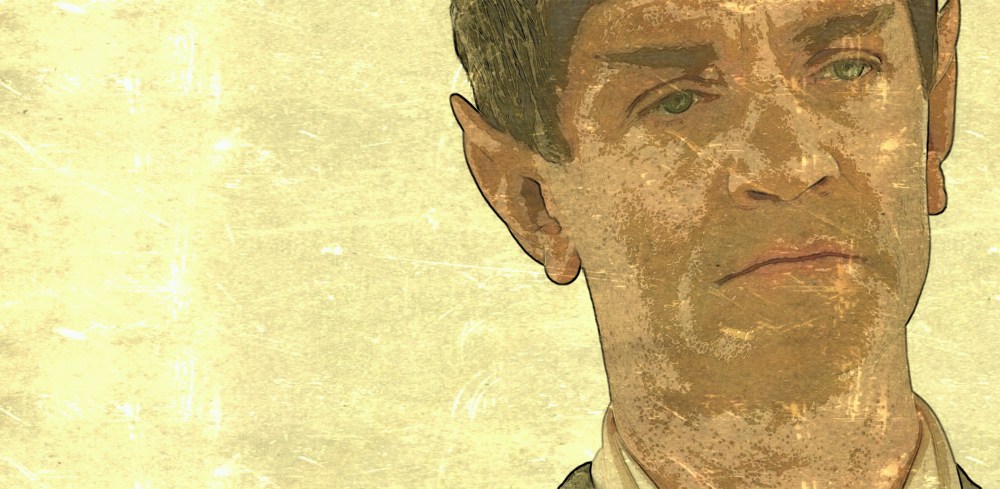
I grew up on ‘extended universes’. Even before I was alternating between episodes of original Star Trek and The Next Generation, I was reading Marvel superhero comics (and even before I could fully read them, I was looking at the pictures). But as I got older, one reason the Marvel Universe stayed with me (even after I’d stopped collecting issues from month to month) is the way it allows for its characters to be portrayed differently by different writers and artists, for different audiences, across decades and generations. The Marvel Universe is a living document in a way that only an extended fictional universe can be, maintaining an ongoing, interconnected continuity which is also, paradoxically, always being reinterpreted.

While the universe of Trek isn’t as sprawling as Marvel’s (metaphorically, at least), it also allows for both ongoing continuity and constant reinterpretation. For instance, I think much of our idea of Gene Roddenberry’s ‘vision’ for Trek actually comes from early seasons of The Next Generation, and is retroactively projected onto The Original Series; as I’ve observed in other posts, while TOS may be an optimistic portrayal of humans working together, its version of the Federation explicitly isn’t post-scarcity and post-currency, as TNG’s is. And since TNG only ever told us that the Federation was a post-scarcity utopia, without ever really showing us how such a system would work, the writers of later series, like Deep Space Nine and Discovery, have taken it upon themselves to explore some of the less utopian aspects of the Federation. To me, having grown up, as I said, watching TOS reruns and newly-airing episodes of TNG concurrently, this sort of thing is a feature, not a bug. TOS and TNG and all the other Trek series will always exist, to be viewed in isolation if we want to, but personally, I want later installments of the franchise to not only add to the story, but give us a new perspective on it as well.
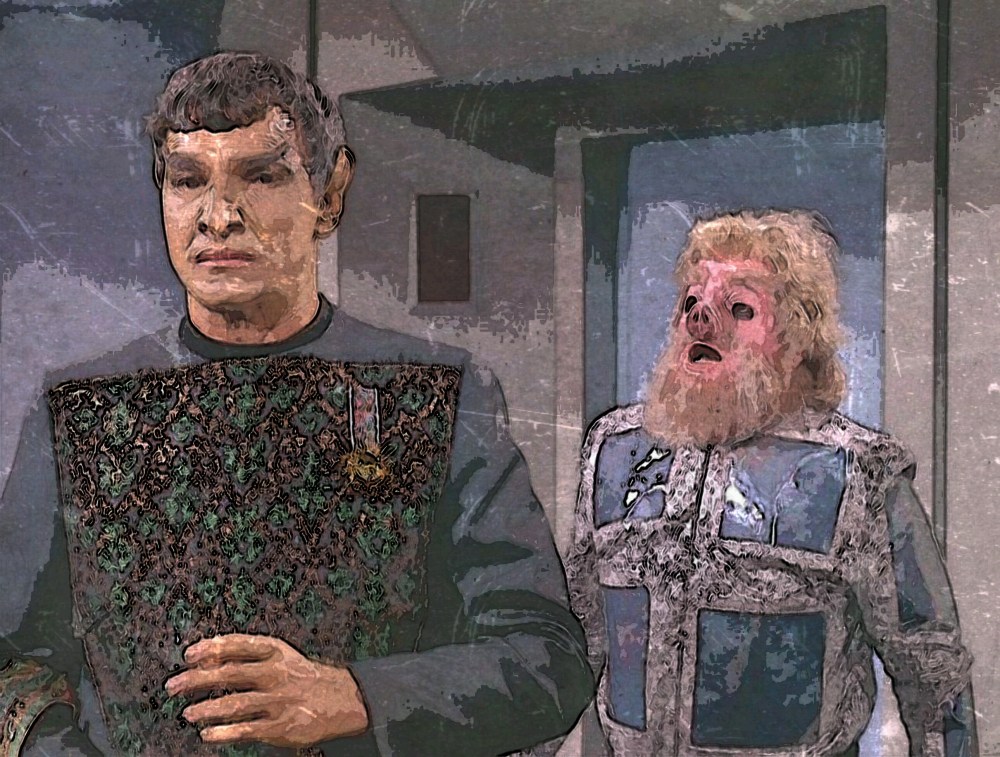
In the character of Sarek, we have a really interesting example of this. In “Journey to Babel”, TOS presents him as the archetypal distant, disapproving father, giving us some insight into Vulcan family structure in general, and Spock’s upbringing more specifically. In “Sarek”, TNG presents him as a different archetype, a brilliant mind tragically losing its grip near the end of a famed life and career. This allows the episode to expand on Sarek’s identity, both as a Vulcan and as Spock’s distant dad, by giving us a glimpse of the emotions he’s spent a lifetime suppressing. And in “Lethe”, Discovery takes this one step even further. It adds depth both to his disapproval of Spock’s Starfleet career in “Babel”, and to the intense mixture of love and regret he can no longer suppress in “Sarek”, by showing us how it all stemmed from a choice that he made.
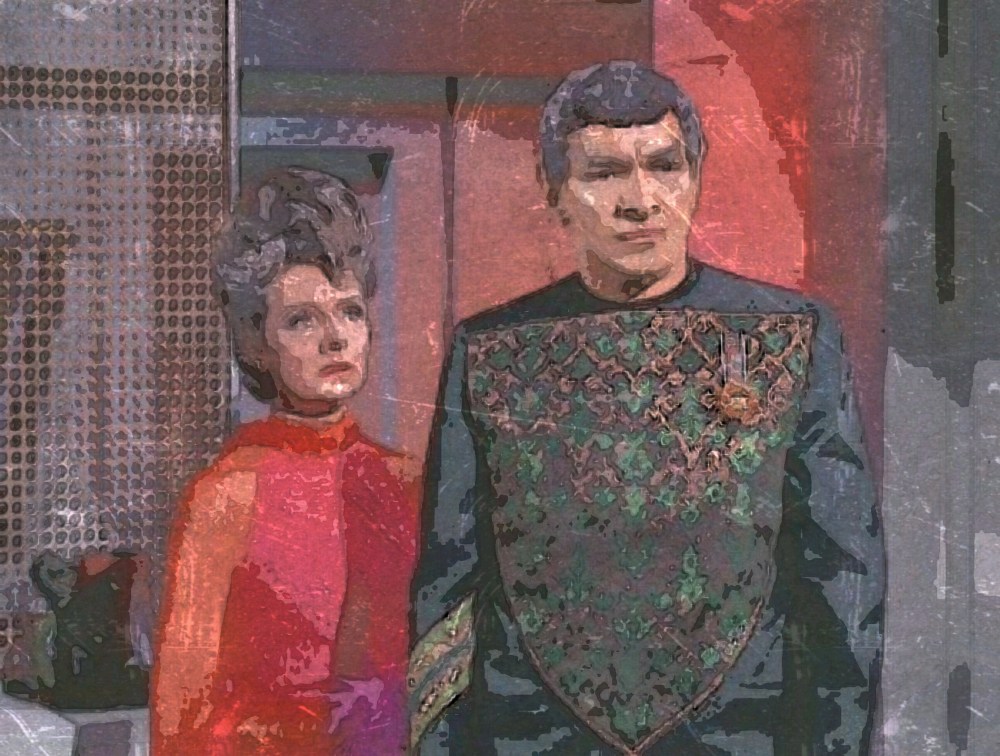
In “Journey to Babel”, Amanda and Spock make repeated references to Sarek’s mannerisms and personality being stereotypically Vulcan. It’s interesting, then, that one of the very first things we see Sarek do is refuse Spock as his guide around the Enterprise, and go out of his way to avoid speaking to his son. The ‘silent treatment’ trope makes sense as part of a ‘disapproving dad’ story, but it doesn’t seem particularly logical, does it? I would expect a truly stereotypical Vulcan to accept Kirk’s offer of a tour from Spock, and simply suppress whatever discomfort he felt. And where Spock’s small, subtle displays of emotion can be explained away by his being half human, Sarek of course doesn’t have that excuse. So right from the beginning, I think, we’re given the impression that either a) Vulcans in general may be more emotional than we’ve been led to believe, or b) Sarek specifically might be more in touch with his emotions than the average Vulcan. If it’s the latter, that might explain his ability to connect with humans — Amanda, and as we’d see later, his adopted daughter, Michael Burnham, and his second wife, Perrin – in a way that other Vulcans might not (even if he seems cold toward them by human standards).

With “Sarek”, TNG expands on that idea, and spins the familiar low-key tragedy of the distant father-son dynamic into what might be a more personal, more unique tragedy for Sarek. His loss of emotional control in this episode – and his accidental spreading of that loss of control to the crew of the Enterprise D – is, of course, linked to a “rare” Vulcan disease, one that’s quite clearly presented to us as an analogue to Alzheimer’s. But, given those subtle hints in “Babel” toward Sarek being a bit emotional for a Vulcan, I wonder if we can’t read his decline as being, at least in part, a tragic result of his own inability, or unwillingness, to acknowledge his unusually strong emotions. His failure to deal is enabled, though with good intentions, by Perrin and by his staff, who shield him from the knowledge of how much control he has actually lost, and I wonder if this hasn’t been going on for much of Sarek’s life … if he hasn’t been able to fool himself, to some extent, about the extent to which he’s in control of his emotions, by virtue of the fact that everyone around him respects his position enough to simply assume he is the logical, unemotional, model Vulcan.

“Sarek” culminates with Captain Picard experiencing the full range and strength of Sarek’s emotions through a mind meld, so that the ambassador will be able to maintain his self-control throughout his diplomatic negotiations. It’s a great, moving scene, a relatively early example of TNG’s writers taking full advantage of Patrick Stewart’s acting chops. His portrayal of Sarek’s raw, unchecked emotions stands in stark contrast both with his typical portrayal of the stoic, professional Picard, and with Mark Leonard’s performance (in this episode and in “Journey to Babel”) as Sarek, which is second only to Leonard Nimoy’s Spock as the definitive portrayal of a Vulcan.

But what I find most interesting about that scene is how specifically written and performed Sarek’s unchecked emotions are. What we see isn’t Picard pinging back and forth between random, radically different emotions; it isn’t a loss of emotional control in that sense. Sarek’s emotions, as experienced by Picard, are solidly focused on his love for his family, and the regret, frustration, and sadness he feels at not being able to fully express that love. Decades before the revelations to come in “Lethe”, “Sarek” already suggested that what Sarek feels most for Spock, beneath his restrained façade, is not disappointment or disapproval of his son’s choices, but regret and shame at his own choices regarding Spock. Again, I think that specificity suggests that there might be more going on beneath Sarek’s façade than just the typical strain and stress that all Vulcans must experience as the cost of suppressing their emotions. I think, again, we’re getting the suggestion that Sarek may have been experiencing stronger emotions than most Vulcans for some time already.

And, as a final thought on that great scene, it’s a nice touch to have Dr. Crusher sitting with Picard during his ordeal … not in sickbay, but in the more intimate setting of Picard’s quarters. Her support of Picard – and the way she is clearly moved by the emotions he’s experiencing, but continues to be a calm, reassuring presence for her friend – is genuinely touching. But it also seems significant to me that it would be Crusher who supports Picard in this scene, given that the two of them would have, throughout TNG, a relationship that always seemed like it could become romantic, but sadly never did. I’m not sure what the writers’ thoughts would have been at that point in the series regarding the chances of a Picard-Crusher relationship, but nevertheless, looking back now, this touching moment of closeness between two characters who will never be as close as they might like to be resonates nicely with Sarek’s regret at not being closer with his loved ones.

It’s in “Lethe” – an episode set chronologically before both “Sarek” and “Journey to Babel”, but produced and aired literally half a century after “Babel” – that we finally see the roots of this subtle through-line for Sarek’s character. His original sin is revealed to us through Burnham’s experience of entering the injured Sarek’s mind, through the psychic link they’ve shared since Sarek brought her back from the brink of death as a child. After earlier episodes of Discovery established that Burnham had been adopted by Sarek and Amanda, “Lethe” shows us a scene from Burnham’s youth, in the form of a memory Sarek’s delirious mind has fixated on: the day Burnham was denied admission to the Vulcan Science Academy. In a clever variation on Sarek’s unwillingness to acknowledge Spock in the early scenes of “Babel”, “Lethe” shows Sarek physically refusing to let Burnham in (well, physically in their shared mental experience of Sarek’s memories, but you know what I mean). And, just as we learned in “Sarek” that his coldness toward Spock was more about his own hang-ups than how he really felt about Spock, we see in “Lethe” that Sarek’s attempts to keep Burnham out of his mind, and his dying fixation on the memory of her failure, is really about his own failure, and the shame he feels as a result. We see that Burnham was denied entrance to the Vulcan Science Academy, not by the Academy, but by Sarek himself, who was forced to choose between Burnham and Spock for admission, and chose Spock.
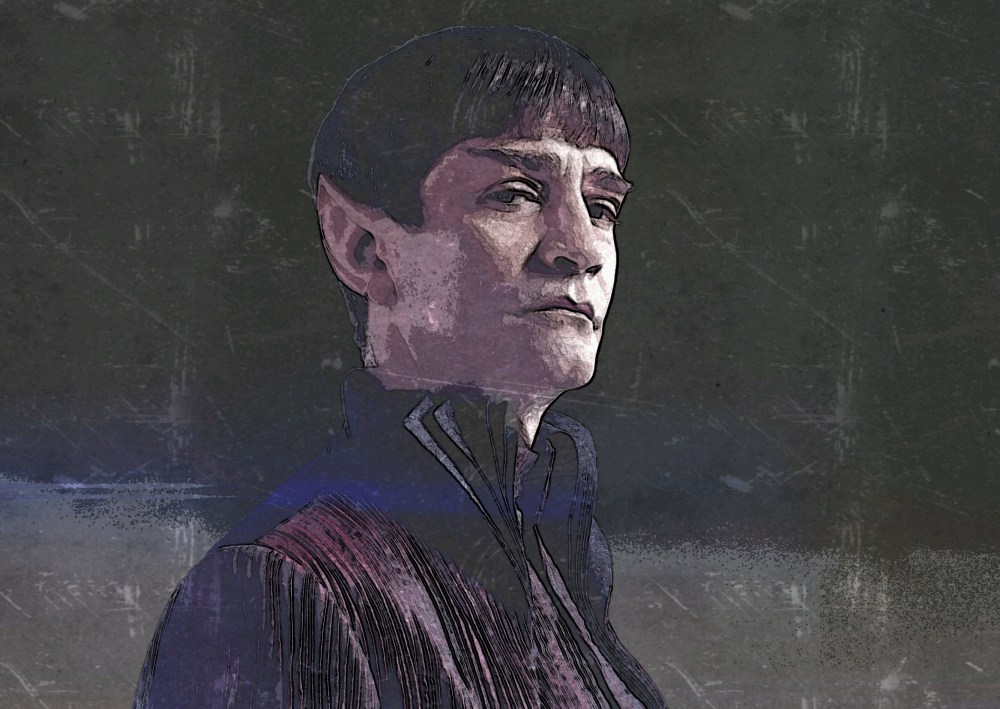
I like that the episode makes it clear almost immediately – through Burnham’s own words – that Sarek was unfairly placed in an impossible position, and that his original sin does not lie in the fact that he chose one of his children over the other. Granted, we might argue that, when placed in the position of making a cruel choice as part of a rigged system, it’s morally better to abstain from choosing altogether … but it’s hard to fault a Vulcan for logically concluding that it would be better for one of them to be admitted than neither of them. No, Sarek’s original sin wasn’t choosing Spock over Burnham, but lying about it. Yes, it was a lie of omission – I don’t believe he ever straight-out told young Burnham who chose not to admit her – but what an omission.
 By not telling his family about the ultimatum he was given (we’ll take one human, or one half-human, or neither, but not both), Sarek left Burnham with the false impression that she’d failed him, that she wasn’t the incredibly talented and intelligent “being of pure logic” that Sarek knows, and humble-brags to other Vulcans, that she is. Not only was this cruel to young Burnham in the moment, but it’s clearly something she internalized and carried with her to the present day. We can see this in her overzealous mentoring of Cadet Tilly, of course, but I think it’s fair to wonder if we didn’t also see it in her attempted mutiny in Discovery’s first episode. If her memories of that rejection hadn’t left her with the obsessive habit of putting too much pressure on herself, might she have simply accepted Captain Georgiou’s decision, right or wrong, as the captain’s decision to make? And might she have, at the very least, saved herself the pain of knowing that she’d betrayed someone who treated her like the daughter she always wanted to be to Sarek?
By not telling his family about the ultimatum he was given (we’ll take one human, or one half-human, or neither, but not both), Sarek left Burnham with the false impression that she’d failed him, that she wasn’t the incredibly talented and intelligent “being of pure logic” that Sarek knows, and humble-brags to other Vulcans, that she is. Not only was this cruel to young Burnham in the moment, but it’s clearly something she internalized and carried with her to the present day. We can see this in her overzealous mentoring of Cadet Tilly, of course, but I think it’s fair to wonder if we didn’t also see it in her attempted mutiny in Discovery’s first episode. If her memories of that rejection hadn’t left her with the obsessive habit of putting too much pressure on herself, might she have simply accepted Captain Georgiou’s decision, right or wrong, as the captain’s decision to make? And might she have, at the very least, saved herself the pain of knowing that she’d betrayed someone who treated her like the daughter she always wanted to be to Sarek?

And the final element of this tragedy, of course, is that even after Sarek made the seemingly logical choice to have one of his children admitted to the Academy rather than none, it all came to nothing anyway … and all because Sarek wasn’t honest with either Burnham or Spock. We’d already learned, in “Journey to Babel”, that Spock had gone against Sarek’s wishes by joining Starfleet, but it’s interesting to look back on “Babel” after what we’ve learned from “Lethe”. If you didn’t feel bad for Spock at seeing how Sarek treats him in “Babel” before, it’s almost impossible not to now that we know just how unfair Sarek’s expectations of Spock really were … and now that we know that Spock couldn’t possibly have known in advance just how disappointing his decision would be to Sarek, because Sarek never told him that the opportunity Spock was rejecting was not just his own, but Michael’s, too.

One of the more tragic moments in “Journey to Babel” comes when Amanda is trying to convince Spock to let someone else take command of the Enterprise so that he can give his father the blood transfusion he needs. When Amanda begs Spock to put his father’s life before his duty, Spock points out, with a trace of sadness in his voice, how much Sarek would disapprove of that idea. Even before “Lethe”, this was a tragic line, showing how much Spock’s identity had been shaped by a father who still didn’t approve of the way he lived his life. After “Lethe”, that line becomes doubly tragic, in that it shows how Spock, like Burnham, has been shaped and driven by the belief that he let his father down, when in fact it was Sarek who let them down, who let himself down, by not being honest with them.
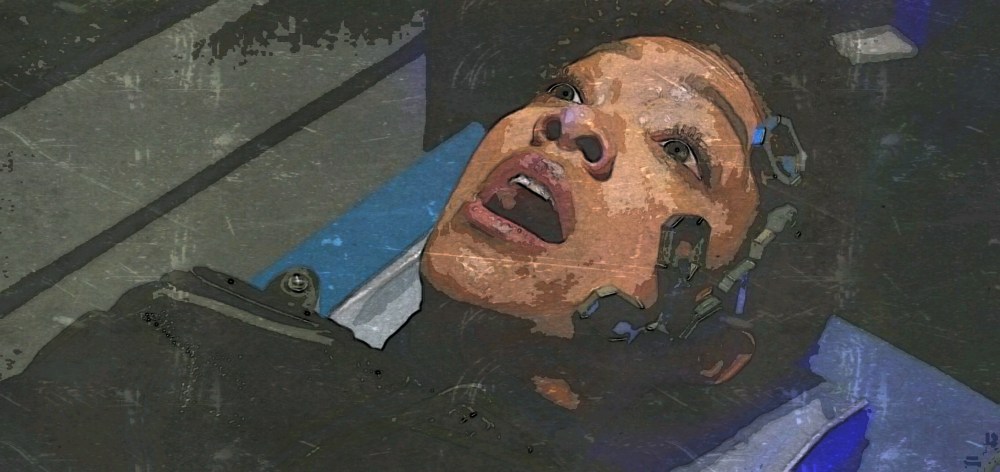
Which leads us back to the notion that Sarek may be more driven by his emotions than Vulcans are supposed to be. Why did he lie? Not only are Vulcans famously opposed to lying in general, but it certainly seems like being honest with his family about what he was being forced to do would have been the more logical choice. After all, the desire of the Vulcan higher-ups to “titrate” the influence of humans on Vulcan society would seem to be rooted in prejudice … and prejudice is inherently illogical. To go along with their wishes might be more logical than denying a spot to both his children, but to go along with their wishes secretly – and in doing so, to falsely imply that Burnham wasn’t good enough because she’s biologically human – is to perpetuate and reinforce the illogical prejudice that put him in this awkward position in the first place … a prejudice which, for all his faults, Sarek probably doesn’t share.
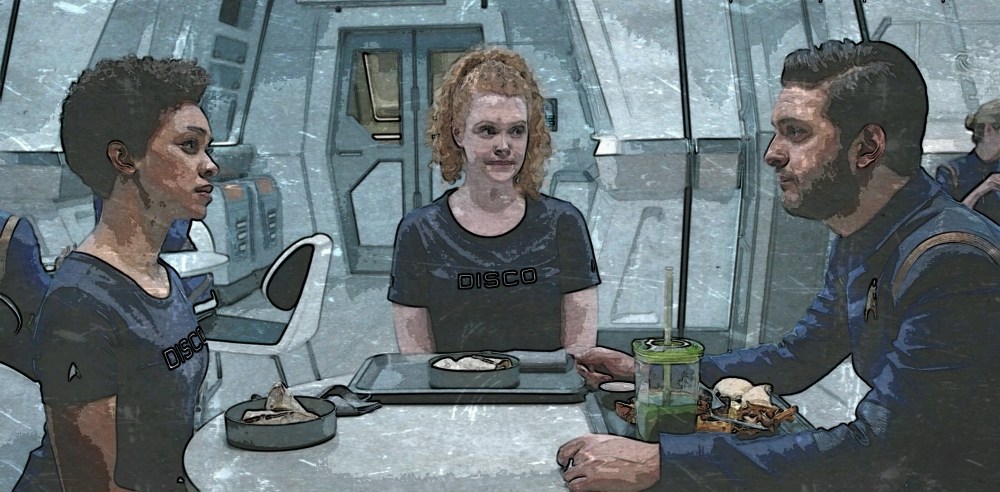
His failure to tell the truth seems, to me, to be rooted in emotion, namely shame; shame over the fact that, after working so hard with Burnham to make her an ideal member of Vulcan society, he wouldn’t oppose the systemic prejudice that would still, illogically, deny her a place in that society. This shame would only grow as his decision backfired, and as he saw the negative effect it had on his children; he admits as much to Burnham after she rescues him in “Lethe”. And we see it again, I think, in the emotions Picard experiences for him in “Sarek” … which might not bode well for Burnham’s vow, at the end of “Lethe”, to work on their relationship. But at the very least, she seems to have learned, from Sarek, how not to manage her own emotions, and her expectations of others. Her advice that Tilly should find her own path to command, rather than following Michael’s, is a direct answer to the pressure Sarek placed on her (and on Spock, for that matter). And the emotional confusion she expresses to Tyler – “I think about him and I want to cry, but I have to smile; and I feel angry, but I want to love” – suggests that she may, over time, learn to acknowledge and reconcile her emotions in a healthier way than Sarek ever will.

Next time: after getting emotionally intense with Vulcans in the 23rd and 24th century, we’ll take a light-hearted look at Vulcans (and Ferengi) in the 20th century, with Deep Space Nine‘s “Little Green Men” and Enterprise‘s “Carbon Creek”!
I think a lot of famous people have been driven by inner demons that make their careers a success but was really rough on their personal lives. At the same time, people who put their personal relationships first probably won’t become successful enough to become a famous actor, a general, politician, etc. In this case, Sarek is walking a thin line between his attraction to humans that makes him a good ambassador but playing the perfect Vulcan so he would be trusted to represent Vulcan in foreign affairs.
LikeLiked by 1 person
This is a really good point. The Vulcan authority figure we saw him dealing with in his memories in “Lethe” definitely seemed to be using that thin line against him: I got the distinct impression that there was no objection Sarek could make, no matter how logical, that wouldn’t be dismissed as emotional (with whatever consequences that might carry for his career).
LikeLiked by 1 person